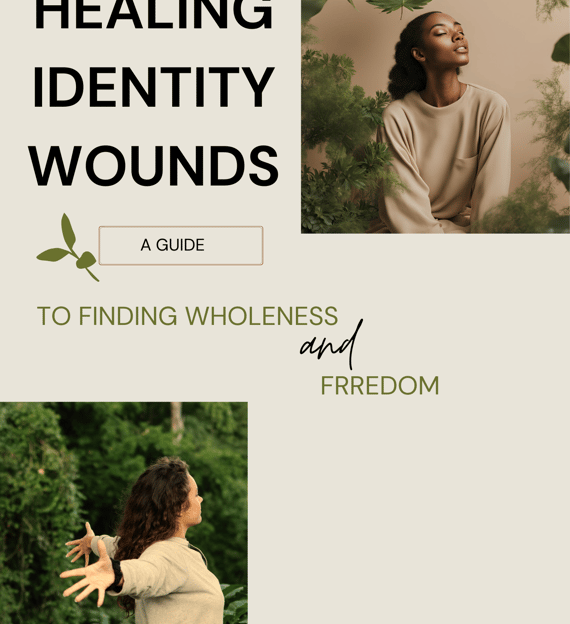HEALING IDENTITY WOUNDS
14 Questions to ask yourself to discover your identity wounds.
BOOK RECOMMENDATIONS
1/29/20253 min read


As human beings, we all face experiences that leave lasting wounds, shaping how we see ourselves and the world. These wounds, often called "identity wounds," arise from moments of emotional pain, rejection, or brokenness. Though such wounds are a shared part of the human experience, they do not have to define who we are.
For those that read my eBook that goes into detail about the identity wounds, these additional questions will help dive deeper into how identity wounds can shape various aspects of a person’s life. Understanding these patterns is an important step in healing and reclaiming one’s sense of self.
Disclaimer: These questions in no means give diagnosis, they are guidelines meant to help identify and explore these wounds, leading to deeper self-awareness and healing. Recognizing how they’ve shaped your self-perception, relationships, and behaviors is an important step in reclaiming your personal power and healing.
Questions to help you discover your identity wounds.
1. Do I often feel like I need to hide my true feelings or thoughts to avoid conflict??
This could point to a wound of rejection or fear. You may have learned to suppress your true emotions to prevent rejection, criticism, or conflict, leading to inner tension and discomfort in expressing yourself.
2. Do I struggle with setting boundaries because I fear disappointing others or being abandoned?
This could suggest a wound of abandonment or fear. You may fear that setting boundaries will lead to rejection or cause others to leave, making it hard to assert your needs or protect your emotional well-being.
3. Do I often compare myself to others and feel like I fall short or don't measure up?
This might indicate a wound of shame or rejection. Constantly feeling like you’re not as good as others can come from past experiences of being compared, criticized, or not feeling good enough.
4. Do I find it difficult to ask for help because I don’t believe others will offer support?
This could reflect a wound of abandonment or powerlessness. If you’ve been let down in the past when you needed help, you may have developed a belief that people won’t be there for you when you need them most.
5. Do I struggle to believe in my own abilities or feel incapable of achieving my goals?
This could suggest a wound of powerlessness or fear. A history of setbacks or doubts may have led to a lack of confidence in your skills, making it hard to take action toward your aspirations or believe that success is possible for you.
6. Do I hide parts of myself to avoid being judged or criticized?
This could suggest a wound of shame. You may have been shamed for being yourself in the past, making you feel like you need to conceal your true self to avoid rejection or ridicule.
7. Do I push people away when I feel like I need them the most?
This could indicate a wound of abandonment or rejection. You might fear being let down, so you distance yourself from others to avoid the pain of potential loss or rejection.
8. Do I often feel like I’m not good enough no matter how much I try?
This is a possible manifestation of shame or rejection. You might constantly feel like your efforts don’t measure up, leading to feelings of inadequacy and self-criticism.
9. Do I feel like no one truly understands me or sees the real me?
This could indicate a wound of isolation or confusion. You might have a deep-seated belief that others cannot relate to you, leading to a sense of loneliness and disconnect.
10. Do I feel like I’m walking through life without a clear purpose or direction?
This suggests confusion. If you’ve experienced moments where your life seemed aimless or uncertain, it can create an ongoing struggle to define your purpose or make meaningful choices.
11. Do I sometimes feel like I’m always on edge, expecting something bad to happen?
This may signal a wound of fear. Living with constant anxiety or vigilance could stem from past trauma or insecurity, leading to heightened alertness in daily situations.
12. Do I often feel like my emotions are out of my control or that they overwhelm me?
This could reflect powerlessness. If you’ve experienced emotional chaos or been unable to cope with your feelings in the past, it can lead to a sense of being overwhelmed and helpless.
13. Do I find it difficult to believe in love, success, or positive change?
This might indicate a wound of hopelessness or fear. Past heartbreaks, failures, or disappointments may have caused you to doubt that anything good is possible for you.
14. Do I feel like others have power over me or that I can’t stand up for myself?
This could indicate a wound of powerlessness. If you’ve felt controlled, invalidated, or unheard in the past, you may struggle to assert yourself or feel like your voice doesn’t matter.
Connect
Support
Learn
infor@preshaffairs.com
© 2024. All rights reserved.


